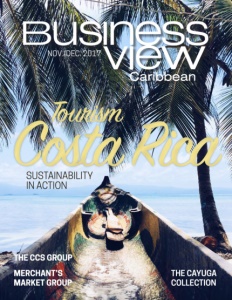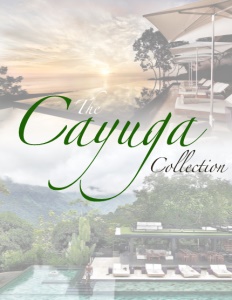Business View Caribbean interviews Hans Pfister, CEO of The Cayuga Collection, as part of our series on sustainable Caribbean resorts.
The Cayuga Collection – Sustainable luxury
The Cayuga Collection is a hospitality management company whose current portfolio consists of eight award-winning, sustainable hotels, resorts, and ecolodges in beautiful and remote corners of Costa Rica and Nicaragua. “It started in 1999, with the owners of Lapa Rios Lodge on the Osa Peninsula,” says Company CEO, Hans Pfister. “They were Peace Corps volunteers from Minnesota; he was a lawyer, she was a school teacher and musician. They sold everything, bought land in the Osa Peninsula in the rain forest, built a lodge and school, and were very successful. But it came to the point where they were there 24/7/365, and it wasn’t what they had in mind as their dream project. So, they closed down the lodge for a week and said, ‘We’re going to do the Eco-Lodge Owner Dilemma Conference.’”
“They invited people from all over the world that they thought could help them and came out with two conclusions at the end of the week,” Pfister continues. “One was to make sure that their 1,000-acre rain forest preserve be protected in perpetuity, and they did that with an easement with the Nature Conservatory and a local organization; and two was that they needed professional management. Out of this, the concept for our company was born and we’ve been involved in management ever since.”
The Cayuga Collection is a partnership between Pfister and Andrea Bonilla. “We met at Cornell University’s Hotel School in the ‘90s, and we had different jobs all over, but then came together to do Cayuga,” Pfister recounts. “If there is somebody who owns a small hotel or lodge in a remote place, but it’s a high level operation, and they don’t want to run it themselves, they will be looking for somebody to run it. Our business model is to provide our services to these people and that’s something that the bigger chains are not interested in because it’s not attractive financially. So, the Cayuga Collection was basically born out of necessity of those owners. We run the company for them; we hire the staff, we do the purchasing, we pay the bills, we do human resources, we do marketing, we do accounting, we take care of everything.
“What ties all of these projects together is the philosophy of sustainability and luxury. We have a corporate team of 11 people that ensure quality, financial performance, continuity, etc., for the owners. It’s long-term relationships that we have with our owners to ensure that the operation goes smoothly. They don’t have to worry about it; they can either take care of their other businesses or they can just go surfing.”
Today, the Lapa Rios Ecolodge is still the Collection’s flagship operation, consistently voted as one of Latin America’s top resorts by Conde Nast Traveler, Travel & Leisure Magazine, and the Andrew Harper Hideaway Report. It has just 17 freestanding bungalows, all with stylish decor, comfy beds, private patios, hammocks, outdoor showers, and good plumbing inside, but no AC and minimal lights. The Osa Peninsula is home to 2.5 percent of the world’s biodiversity and many endangered species, and the hotel offers daily excursions into the surrounding jungle.
The Arenas Del Mar Beach and Nature Resort is a stunning, luxury and sustainable 38-room, exclusive beach and nature resort with spectacular views of the Manuel Antonio National Park on the Central Pacific coast of Costa Rica. It’s nestled in eleven acres of rainforest with private trails and two tree-shaded, white sand beaches.
The Harmony Hotel, which opened in 2004, is a lush, sustainable property, where guests can mingle with hummingbirds and howler monkeys. Situated on Guiones Beach in Nosara, Costa Rica, the ten-room property is a stone’s throw from a pristine surf break with consistent year-round waves, ideal for a surfing adventure.
The Finca Rosa Blanca Coffee Plantation & Inn may well be Costa Rica’s most exclusive hideaway. It offers 13 unique suites focused on coffee culture, comfort, art, and design. Surrounded by volcanoes, the Inn is only 20 minutes from the international airport. Finca Rosa Blanca features a restaurant and bar with magnificent views, a full service spa, and private tours of the Inn’s organic, shade-grown coffee plantation.
The Latitude 10 Resort in Santa Teresa, Costa Rica features only five open-air casitas on a private beach. Activities include surfing, hiking into Cabo Blanco Nature Reserve – Costa Rica’s first national park, sea kayaking, horseback riding, and snorkeling, plus a wide variety of spa and wellness services.
Situated on a shady street just off Paseo Colon, San Jose’s main thoroughfare, Hotel Grano de Oro is a true oasis in the heart of the capital city. Converted from a tropical Victorian mansion, the 40-room hotel maintains the warmth and comfort of a private home with all the amenities of a fine hotel.
Kurà Design Villas is an exclusive, small-scale boutique hotel on the Southern Coast of Costa Rica, where the rainforest covered mountains tumble onto pristine beaches. Built on an impressive mountain ridge, Kurà´s tropical minimalist architecture provides a luxurious jungle experience and breathtaking Pacific Ocean views.
Finally, Jicaro Island Ecolodge is Nicaragua´s most high-end eco-resort located on a private island in Lake Nicaragua. Winner of the exclusive National Geographic’s Lodges of the World award, its nine private luxury casitas are located just a short boat ride from the colonial town of Granada. It offers spectacular views of the Mombacho Volcano across the lake.
Pfister reveals that his company doesn’t advertise its services. “People find us,” he says. “It’s either word-of-mouth, or they find one of our properties and find out that it’s managed. Right now, we’re consolidating our presence in Nicaragua, Panama, and Costa Rica. We want to cover those three countries and expand, especially in Nicaragua and in Panama. But we’re also looking at the Caribbean and the northern part of South America. We do have demand from other parts of the world, but in terms of logistics, we have decided not to pursue that at this point in time unless it’s some kind of consulting arrangement. Since we’re all about sustainability, we’re also about sustainable growth, as well. We don’t want this to get too crazy too fast. So, for the next ten years, you’ll see us very much in the region.”
The Cayuga Collection’s newest property is currently under construction in Panama, and will open in June 2018, adding 14 more rooms to the current 145 rooms among the other eight locations. “We’ve been involved in the project in Panama for over a year now,” says Pfister, “because the decisions you make when you build something have a huge impact on operations and marketing and the guest experience.”
Due to its proximity to North America, Pfister reports that about 70 percent of the Collection’s guests come from the U.S. and Canada; 25 percent come from Europe, and five percent from other places. “However, this year, there’s been a significant increase in direct flights from Europe to Costa Rica, so we expect the portion of European travelers to increase. It won’t replace the U.S. market, but it certainly will play a more important role.”
Pfister adds that over the last year or so, the Collection has invested a lot in the food and beverage experience across its properties. “We noticed how important the culinary experience is for our guests, especially when you’re in remote locations and you don’t have many choices,” he explains. “So, making sure that it’s a world-class culinary experience is something that’s really important. At the same time, we’re very focused that it’s very local. We use only local and sustainable ingredients. For example, we partnered with an organization in the United States called Dock to Dish, where we have made an effort to connect our chefs with local fishermen. We have grass-fed beef, hormone-free chicken, local fruits and vegetables. We don’t import from abroad; the focus in on the local experience.”
Pfister adds that the Collection’s sustainability policy extends to the staffing of its properties. “A lot of North Americans, when they hear the word sustainability, they mostly think of energy savings and energy consumption,” he says. “That’s an important part of it, and we’re certainly concerned about that, but to us, sustainability has a lot more to do with people; it’s about hiring locals, and keeping them on staff year round, so we don’t lay people off. There might be a week or a few days where we might close down because we have a more intrusive amount of maintenance work going on, but we try not to.”
The Collection also focuses on marketing what it calls “The Green Season,” which runs from April through November. “It’s a way of taking away the fear of the rainy season from our guests,” Pfister states. “When you live in Toronto or Chicago or Seattle, rain is very negative because it’s usually very cold and ugly. In Costa Rica, if it rains, it’s warm rain and it usually only rains part of the day. So, we’re trying to take away the idea that you can only come to this part of the country in the dry season. Actually the rainy season is quite attractive because everything is green and lush; there’s a lot less people; and everything is cheaper. So, the term, Green Season, was invented by the Costa Rican government, and we’ve adapted it as an industry.”
When asked whether there are any other companies that operate a business model similar to the Cayuga Collection’s, Pfister says there are none that he knows of. “And the question is, ‘Why?’ The only thing I can think of is it’s really hard to do what we do – to operate in remote locations with small properties. Some of our hotels only have six rooms and the economies of scale are not quite there, so that’s why bigger companies shy away from it,” he muses. “Putting together a hospitality management company for such a specialized market is really difficult. But, we love what we do; we see the positive impact in the communities and the people and the environment. And so, even if it’s not the most financially attractive model, it’s certainly very fulfilling and exciting. It’s very easy to get out of bed on a Monday morning and go back to work.”
AT A GLANCE
WHO: The Cayuga Collection
WHAT: Manager of sustainable hotels and ecolodges
WHERE: Costa Rica & Nicaragua
WEBSITE: www.cayugacollection.com




